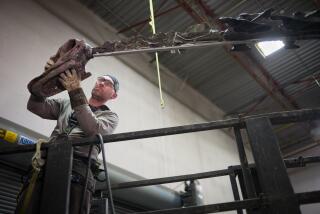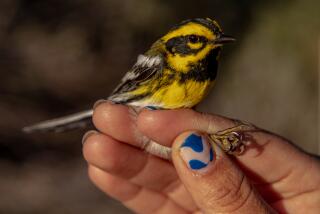Party-Goers Play Heavenly Name Game With Asteroids
- Share via
ITHACA, N.Y. — Sixty lucky revelers at an astronomers’ dinner got what may be the ultimate party favor: asteroids named just for them.
“It’s very nice,” said Beth Clark, who got an asteroid named Bethellen at a recent gathering of participants in a conference on asteroids, comets and meteors at Cornell University. As a research associate at Cornell and a conference organizer, she was becomingly modest about the achievement.
Others were jubilant: a table full of Italian scientists cheered each time one of their number was named in the long roll call of asteroid laureates.
“Some people don’t care, and some people don’t know what it’s about and other people think it’s a wonderful honor to have a chunk of rock, an inert chunk of rock, named after them,” said Ted Bowell, the discoverer of some 600 asteroids. He has given most of the namesake honors away, including dozens donated at the astronomers’ party.
In the past, when confirmed asteroids were scarce, they were named for mythological figures, like the space rock named Eros after the Ancient Greek god of love, or for friends, like the asteroid Mathilde.
A bonanza of recent discoveries has meant that more earthly names are getting celestial bodies all their own. There are so many asteroids that some of the names have to be tailored: astronomer Alan Harris’ new asteroid is named Sirrah, because another astronomer with the same name already has asteroid Harris.
Still, not just anybody can get his name on an asteroid. Political, religious and military figures are not allowed, according to guidelines set by the International Astronomical Union’s Small Bodies Names Committee, which oversees the task.
Dead people or figures likely to offend are also not allowed. The names of pets were used at one time, but that ended after a Very Important Person’s asteroid turned out to be adjacent to the asteroid named for somebody’s cat, said Bowell, of the Lowell Observatory in Arizona.
Asteroids are the only celestial objects that can be named after living persons by their discoverers, Bowell said.
Planetary features--a martian crater or a jovian moon-- can be named for people, but the people must be deceased. Comets are usually named for their discoverers, and distant galaxies and stars generally have only numerical designations.
Asteroids are first given a provisional designation and then observed over four years or more to determine their orbit; whoever confirms the orbit is the discoverer, who then can name the asteroid.
There could be a million or so asteroids in a broad belt orbiting the sun between Mars and Jupiter; a much smaller number, perhaps 1,000, are closer to Earth and may actually cross Earth’s path. All of these asteroids are more than six-tenths of a mile in diameter.
These near-Earth asteroids have been the subject of concern in recent years, especially after scientists first announced and then retracted their suspicion that one such asteroid might collide disastrously with Earth.
Bowell said such asteroids have not been named yet.
(BEGIN TEXT OF INFOBOX / INFOGRAPHIC)
Orbiting Names
The rules for naming asteroids state that the names be inoffensive and preferably less than 16 characters. That said, just about anything goes. Some real asteroid names:
Women: Agnes, Doris, Ethel, Gladys, Fanny
Men: Barry, Jose
Rock musicians: McCartney, Lennon, Harrison, Starr, Clapton, Garcia, Zappafrank
Famous people: Mark Twain, Chagall, Stravinsky, Pavarotti, Jack London, Freud, DiMaggio
Fictional characters: Mr. Spock, James Bond
American presidents: Hooveria, Washingtonia
Food: Beer, Beet, Candy, Ambrosia
Places: Chicago, Acapulco, Czechoslovakia, Pasadena, Louvre
Flowers: Iris, Crocus, Begonia
Miscellaneous: Dainty, Mason-Dixon, Melancholia, Toyota, Smuts, Ra-Shalom, Lick, Lust
Source: Minor Planet Center / Samantha Bonar
More to Read
Sign up for Essential California
The most important California stories and recommendations in your inbox every morning.
You may occasionally receive promotional content from the Los Angeles Times.












